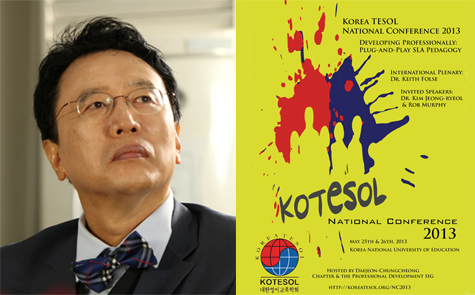
Archive copy.
Smart learning in English education: Top-down vs. Bottom-up
Dr. Jeong-ryeol "Jay" Kim
Abstract
Successful foreign language learning in the "smart era" starts from students in their self-directedness. Teachers are not the knowledge transmitter any more: no teacher can compete with Wikipedia in their knowledge base. Teachers have to be designers and facilitators in that these students are motivated to learn and engage in foreign language learning. Foreign language teachers are those who know how to organize the language input that compels students to engage. It's hard to have students engaged in language-focused classes. It's difficult to imagine that anybody can be interested and motivated in memorizing vocabulary and expressions unless they're instrumental in doing something really interesting. This presentation will contrast two methodologically different approaches to English education. It will argue for a grounded theory of English education based on phenomenological data from the diverse interpretations of English lesson objectives and their subsequent design and implementations. Teachers are not teaching machines tranferring the curriculum-based communicative functions and components of given lessons to students, rather they’re the constructors and interactors with students as to how to interpret, design and implement the communictive functions and compoents of lessons. The presentation will look at these roles in the context of smart learning and show that it is particularly the case when the direction of teaching goes top-down.
Bio-sketch
Jeong-ryeol Kim has a Ph.D. in applied linguistics from University of Hawaii and has been a professor of English at Korea National U. of Education teaching methodology, integrated content and language teaching, and English linguistics. He served as director of planning and vice-dean of center for in-service education at KNUE. He is currently the president of the Korea Association of Foreign Languages Education and was the president of the Korea Association of Primary English Education in 2010 and 2011, and was the president of KOTESOL back in 1995. He has been involved in many different government projects in curriculum, textbooks and English education using information and communications technology. He has published books on Classroom English, teaching methodology, English curriculum, English classroom observation and analysis, etc., and has published numerous articles in the area of elementary English education and technology enhanced English teaching.


